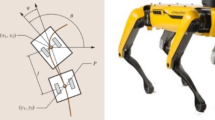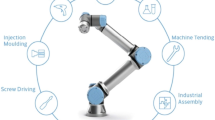Abstract
In this paper, we propose a cooperative multi-robot control system, operating in an unfamiliar or unstructured environment. We focus on a robust model predictive control (robust-MPC) framework that enables robotic agents to operate in uncertain environments, and study the effect of observation uncertainties that arise from sensor noise on cooperative control performance. The proposed system relies on cooperative observation based on an information-seeking theory, in which the system not only can compensate uncertainty, but also takes actions to mitigate it. We carry out a case study that demonstrates a multi-robot collision avoidance scenario in an unknown environment. Simulation results show that the combination of robust-MPC methods and cooperative observation enables the cooperative multi-robot system to move efficiently and reach the goal faster than an uncooperative scenario.









Similar content being viewed by others
References
Mayne DQ, Seron MM, Rakovic SV (2005) Robust model predictive control of constrained linear systems with bounded disturbances. Automatica 41:219–225
Pugh J, Martinoli A (2007) Inspiring and modeling multi-robot search with particle swarm optimization. In: Proceedings of the 4th IEEE Swarm Intelligence Symposium, 332–339
Hofmann GM, Tomlin CJ (2010) Mobile sensor network control using mutual information methods and particle filters. IEEE Trans Autom Control 55(1):32–47
Charrow B, Kumar V, Michael N (2014) Approximate representations for multi-robot control policies that maximize mutual information. Auton Robots 37(4):383–400
Rasmussen C, Hager GD (2001) Probabilistic data association methods for tracking complex visual objects. IEEE Trans Pattern Anal Mach Intell 23(6):560–576
Boyd S, Vandenberghe L (2004) Convex optimization. Cambridge University Press, Cambridge
Ptolemaeus C, editor (2014), System design, modeling, and simulation using ptolemy II. Ptolemy.org. http://ptolemy.eecs.berkeley.edu/books/Systems/
Akkaya I, Emoto S, Lee EA (2015), PILOT: An actor-oriented learning and optimization toolkit for robotic swarm applications. In: Second International Workshop on Robotic Sensor Networks (RSN’15), Cyber-Physical Systems Week 2015, 13, April, 2015
Acknowledgments
This work was supported in part by the Berkeley Ubiquitous SwarmLab and the TerraSwarm Research Center, one of six centers administered by the STARnet phase of the Focus Center Research Program (FCRP), a Semiconductor Research Corporation program sponsored by MARCO and DARPA.
Author information
Authors and Affiliations
Corresponding author
Additional information
This work was presented in part at the 1st International Symposium on Swarm Behavior and Bio-Inspired Robotics, Kyoto, Japan, October 28–30, 2015.
About this article
Cite this article
Emoto, S., Akkaya, I. & Lee, E.A. Information seeking and model predictive control of a cooperative multi-robot system. Artif Life Robotics 21, 393–398 (2016). https://doi.org/10.1007/s10015-016-0315-4
Received:
Accepted:
Published:
Issue Date:
DOI: https://doi.org/10.1007/s10015-016-0315-4




